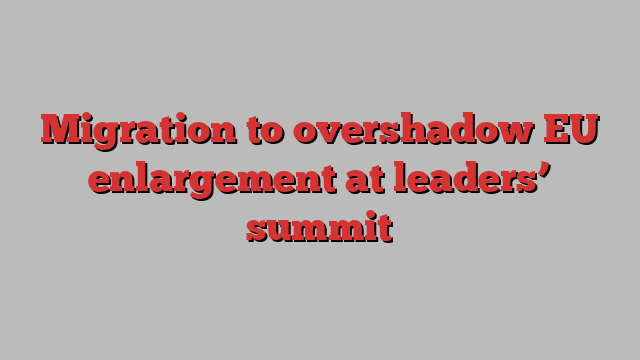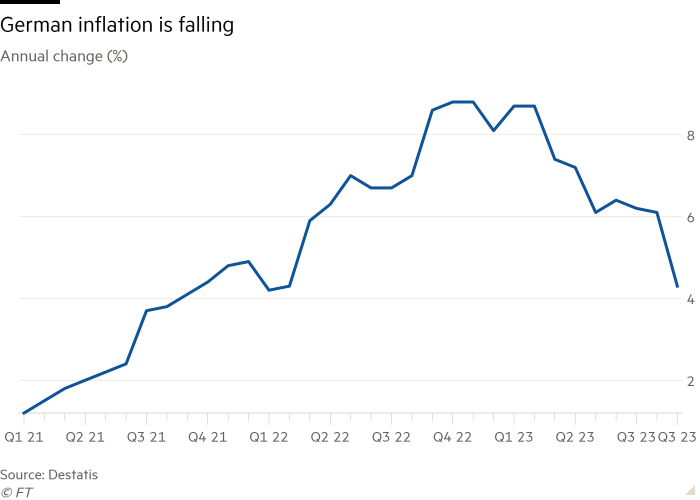
Receive free EU immigration updates
We’ll send you a myFT Daily Digest email rounding up the latest EU immigration news every morning.
This article is an on-site version of our Europe Express newsletter. Sign up here to get the newsletter sent straight to your inbox every weekday and Saturday morning
Good morning. Robert Fico, the anti-Ukraine populist, won the most votes in Slovakia’s election on Saturday. Yesterday he announced plans to form a governing coalition, remarking: “People in Slovakia have bigger problems than Ukraine.”
Today, Alice Hancock and I run you through the draft conclusions for a summit of EU leaders this week, and she reveals why Europe’s solar industry is arguing against tariffs aimed at helping compete with Chinese rivals.
More questions than answers
This week’s informal EU leaders’ summit in Granada was supposed to be all about EU enlargement. It won’t work out that way.
Context: The EU’s 27 leaders meet in the southern Spanish city on Friday. The war in Ukraine has awoken long-frozen talks on adding new members to the EU, but also made stark how ill-suited some of the existing rules, structures and financial systems are for that process.
Chatting about that (monumental) task will still feature on the agenda in Granada, according to a draft joint statement seen by the Financial Times.
It includes the rather anodyne: “Aspiring members need to step up their reform efforts. The Union needs to undertake the necessary internal groundwork. In particular, we will need to address critical questions: What do we do together? How do we decide? How do we match means and ambitions?”
But current events, as ever, have taken over. Migration is now the most pressing political issue for the bloc, and acutely critical for the likes of Italy’s prime minister Giorgia Meloni. It will take up a good chunk of the leaders’ time.
Leaders are set to declare migration “a European challenge that requires a European response . . . which combines increased external action, more effective control of EU external borders, and internal aspects”.
EU interior ministers all but finalised new rules on surges in migration last week, and Meloni is pushing hard for leaders to use their time in Spain to get a large reform package over the line more quickly and deepen co-operation with third countries such as Tunisia.
“It’s the pre-eminent topic right now and [Meloni], in particular, needs to show progress or at least decisiveness,” said one person involved in the summit preparations.
Some kind of political consensus in Granada would help to put guardrails on what has become a woefully messy and disjointed EU response (as Sylvie Kauffmann wrote last week). But it will almost certainly come at the expense of a more detailed debate on enlargement and the EU’s broader strategic vision, as initially intended.
Green campaigners are also irked that the draft two-page declaration, interpreted as a direction of travel for the next European Commission after EU-wide elections next year, has little mention of environmental issues beyond a short note on “deepening climate risks” and promoting “sustainable development”.
“Walls and guns can’t stop floods and wildfires,” remarked Ariadna Rodrigo, democracy campaigner at Greenpeace.
Chart du jour: Beer-onomics

A litre of beer has never cost so much at Munich’s Oktoberfest. But that is not deterring the crowds, whose willingness to shell out €14.40 on a Maß of beer offers vital clues about consumer confidence in Europe’s largest economy, writes Guy Chazan.
Cloudy with a chance of tariffs
Europe’s ailing solar industry is warning that tariffs on cheaper Chinese imports are not the right approach to protect it from unfair competition.
After a long board meeting last week, SolarPower Europe, the industry body, will put out a statement today saying that trade barriers cause a “lose-lose” situation for EU manufacturers, writes Alice Hancock.
Context: In a speech last month, European Commission president Ursula von der Leyen announced an anti-subsidy probe into Chinese electric vehicles. Rumours were swirling last week that Berlin was looking into similar measures to shore up the suffering solar industry.
“The discussion is mounting and some people are calling for trade measures, so we felt it necessary to warn about what the consequences would be,” Walburga Hemetsberger, SolarPower Europe’s chief executive, told the FT.
Last time the EU introduced trade tariffs, the industry “completely collapsed”, Hemetsberger said. It would be better to put in place a coherent industrial strategy with looser rules on state aid, allowing EU countries to fund the running costs of factories, and not just subsidise their investments into capital.
A solar bank, modelled on the EU’s hydrogen bank, which is designed to bridge the gap between the costs of producing energy with hydrogen and what consumers are willing to pay, would also help, she said.
Gunter Erfurt, chief executive of Europe’s largest photovoltaic cell manufacturer Meyer Burger Technology, agreed: “Instead of sanctioning the entire industry through tariffs, we must incentivise solar installations that originate from resilient European solar production.”
The solar industry last month warned that cheap Chinese solar panels were flooding the market and had caused European manufacturers to go bankrupt. Hemetsberger said that the industry needed action from policymakers “within weeks”.
What to watch today
-
EU parliament plenary session kicks off in Strasbourg.
-
International Energy Agency holds climate summit in Madrid.
Now read these
Recommended newsletters for you
Free lunch — Your guide to the global economic policy debate. Sign up here
Trade Secrets — A must-read on the changing face of international trade and globalisation. Sign up here
Are you enjoying Europe Express? Sign up here to have it delivered straight to your inbox every workday at 7am CET and on Saturdays at noon CET. Do tell us what you think, we love to hear from you: [email protected]. Keep up with the latest European stories @FT Europe